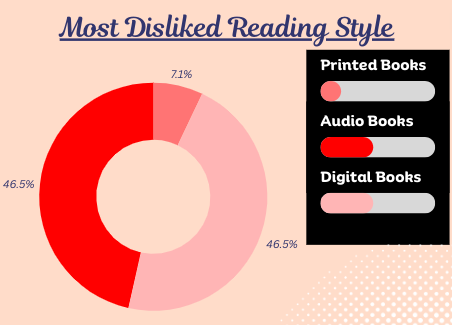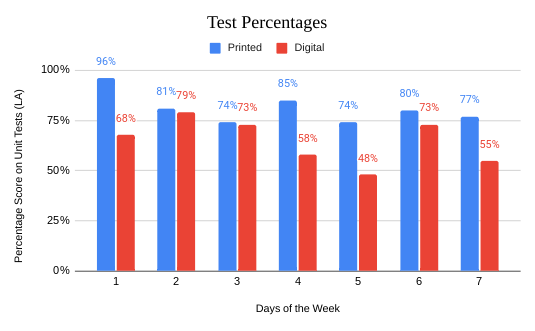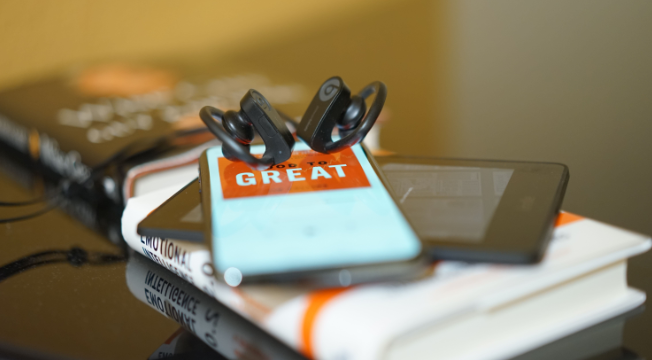Who doesn’t like getting lost in a good story? And as technology advances, new ways to read are coming out such as digital books and audio books. But it begs the question: is one way to read better than the others? Here we analyze both reading comprehension and preference among students.
Popularity – Which style do people prefer?

A questionnaire was sent out to gather info on how people like to read and the results were overwhelming. Physical books dominate in popularity with 74.4% of EPHS students preferring to read with the book in their hand. Many students have stated that they understand and comprehend the story better when they physically hold the book and turn the pages. Another common reason is that audio books and digital books adhere to only one sense while reading a physical book is stimulating to more than just one sense (ex. feeling the book, hearing the pages turn, etc). Second place for popularity were audio books with 16.3% who preferred this way of reading, and last place were digital books at 9.3%.
For lowest popularity, 46.5% of students didn’t like audio books and 46.5% of students said to not like e-books, both tie for the title of least favorite. For e-books, a common reason they’ve been reported to be disliked is because reading words on a screen for long periods of time strains one’s eyes. Many students have also said that oftentimes they would zone out while reading and will have to read a section multiple times to fully comprehend what’s going on. Students who don’t favor audio books have stated that they have a hard time paying attention to the story and will easily get distracted and miss parts of the story. Others have said that they would misinterpret the audio as another form of white noise and would completely zone out while it plays, which matches with studies that state mind wandering is most common when listening to audio books.

Only 7% of students have said they dislike reading physical books, a common reason being that it’s less convenient than if they were to read an e-book or listen to an audio book.
Reading Level
People who like physical books and audio books on average have about the same reading level/comprehension. The main difference between people who like printed vs audio books is their learning style. Auditory learners take in information better via hearing and will generally prefer audio books. Kinesthetic learners, or tactile (touch) learners, benefit from methods that involve physical engagement and prefer to have information presented in a way that they can feel or touch it. Because of this, kinesthetic learners generally prefer printed books. Interestingly enough, studies show that people who mainly read physical books or listen to audio books have a higher reading comprehension than those who mainly read e-books. E-book readers have been shown to read at a slower rate and would often have the tendency to skim the text as oppose to actually reading it, which some researchers blame this on the increased usage of online media.

Those who prefer audio books and printed books score higher in categories such as empathy, immersion of the story, retains information better, and has a better understanding of the narrative and message. There isn’t a lot of research on audio book listeners as to why this is the case, but for printed readers researchers speculate that the sensation of the book and being able to physically see the progress you make benefits the brain’s ability to take in information better.
Conclusion
Physical books are preferred by the overwhelming majority, but with research showing how both audio and printed books can be good for reading comprehension, it’s fair to say that both these methods share the same benefits and whichever one a person would prefer mainly depends on their learning style. However, there is a clear loser in this three way debate: e-books. Not only is it heavily disliked, but research also shows how e-books can actually hinder one’s reading ability.
Sources
7 scientific benefits of reading printed books (no date) Paper & Packaging. Available at: https://www.howlifeunfolds.com/learning-education/7-scientific-benefits-reading-printed-books (Accessed: 22 May 2024).
Artushin, H.R. (2024) The case for paper: Books vs. E-readers, Psychology Today. Available at: https://www.psychologytoday.com/us/blog/well-read/202402/the-case-for-paper-books-vs-e-readers#:~:text=Research%20suggests%20that%20comprehension%20is,visually%20to%20a%20particular%20page. (Accessed: 22 May 2024).
Audiobook growth continues (2022) PublishersWeekly.com. Available at: https://www.publishersweekly.com/pw/by-topic/industry-news/audio-books/article/89547-audiobook-growth-continues.html (Accessed: 22 May 2024).
Ofgang, E. (2022) Listen without guilt: Audiobooks offer similar comprehension as reading, TechLearningMagazine. Available at: https://www.techlearning.com/news/listen-without-guilt-audiobooks-offer-similar-comprehension-as-reading (Accessed: 22 May 2024).
Rizer, A. (2021) How reading ebooks changes our perception (and reviews), BOOK RIOT. Available at: https://bookriot.com/reading-ebooks/ (Accessed: 22 May 2024).





















